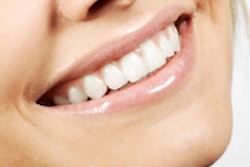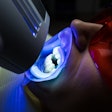
The contentious issue of teeth whitening in malls and spas has flared up in Connecticut, where a public interest law firm on Wednesday filed a lawsuit against members of the Connecticut State Dental Commission, contending that the commission illegally shut down small businesses that offered the procedure at lower prices than dental offices.
The lawsuit was filed in the U.S. District Court for the District of Connecticut.
Earlier this year, a U.S. Federal Trade Commission (FTC) judge ruled that the North Carolina dental board's efforts to block nondentists from providing teeth-whitening services constituted an illegal anticompetitive conspiracy.
Now the Connecticut State Dental Commission is embroiled in a similar battle.
“Rather than lowering their prices, they are trying to make competition illega.”
— Paul Sherman, Institute for Justice
Plaintiff Lisa Martinez, who opened her teeth-whitening business inside Crystal Mall in Waterford, CT, in 2008, alleges in the complaint that the dental commission shut her down illegally. Martinez sold an over-the-counter whitening product and provided a place for customers to apply the product. Her prices ranged between $109 and $139, depending on the length of the service.
Almost from the first day she opened her business in November 2008, Martinez claims she was harassed by dentists and dental hygienists who would come into her store and accuse her of breaking the law or threaten to have her business shut down, according to a litigation backgrounder.
After a June ruling by the Connecticut State Dental Commission made it a crime punishable by up to five years in jail or $25,000 in fines for anyone but a licensed dentist to offer teeth-whitening services, she closed up shop.
The two other plaintiffs, Tasos Kariofyllis and Steve Barraco -- co-founders of Smile Bright, a Connecticut company that offered teeth-whitening services in spas and salons -- also stopped providing the service after the ruling, opting to sell only a teeth-whitening kit for home use.
"I think the ruling had nothing to do with protecting public interest," said Paul Sherman, staff attorney for the Institute for Justice, which filed the suit on behalf of Martinez, Barraco, and Kariofyllis. "It was about protecting dentists from competition."
What constitutes 'practice of dentistry'?
Both businesses provided customers a prepackaged teeth-whitening product, instructions on how to apply the product to their teeth, a chair to sit in while using the product, and an enhancing light.
However, in its June ruling, the dental commission said that teeth-whitening services constitute the practice of dentistry when they include, among other things, "making recommendations of how to perform teeth whitening," "utilizing instruments and apparatus such as enhancing lights," or "instructing a customer on teeth-whitening procedures or methods."
The commission passed this ruling after getting complaints from the Connecticut State Dental Association, according to Sherman.
"The complaints were not about consumers being harmed but about these businesses practicing dentistry," he told DrBicuspid.com.
The ruling also noted that risks are associated with tooth whitening and that it is important that a dentist perform an exam of the dentition using radiographs to detect caries, defective restorations, or pulpal pathology, which should be treated prior to bleaching.
"These are over-the-counter products applied by the patients themselves," Sherman said. "The risks of using them at a salon or mall are the same as using them at home."
Following the June ruling, the Connecticut Department of Public Health sent letters to Barraco and Martinez, directing them to "voluntarily cease the practice of offering teeth-whitening services" and threatening legal action if they did not, according to court documents.
There is no evidence that Connecticut's prohibition on nondentist teeth whitening protects consumers or advances any other legitimate governmental interest, according to the lawsuit. Rather, the dental commission adopted its declaratory ruling to protect dentists who offer teeth-whitening services from competition, the complaint states.
"Dentists charge four times as much for these procedures, and rather than lowering their prices, they are trying to make competition illegal," Sherman said.
The Connecticut State Dental Commission declined to comment on the case, issuing the following statement: "Until such time as the department has seen the lawsuit, we would not be able to discuss this matter."



















